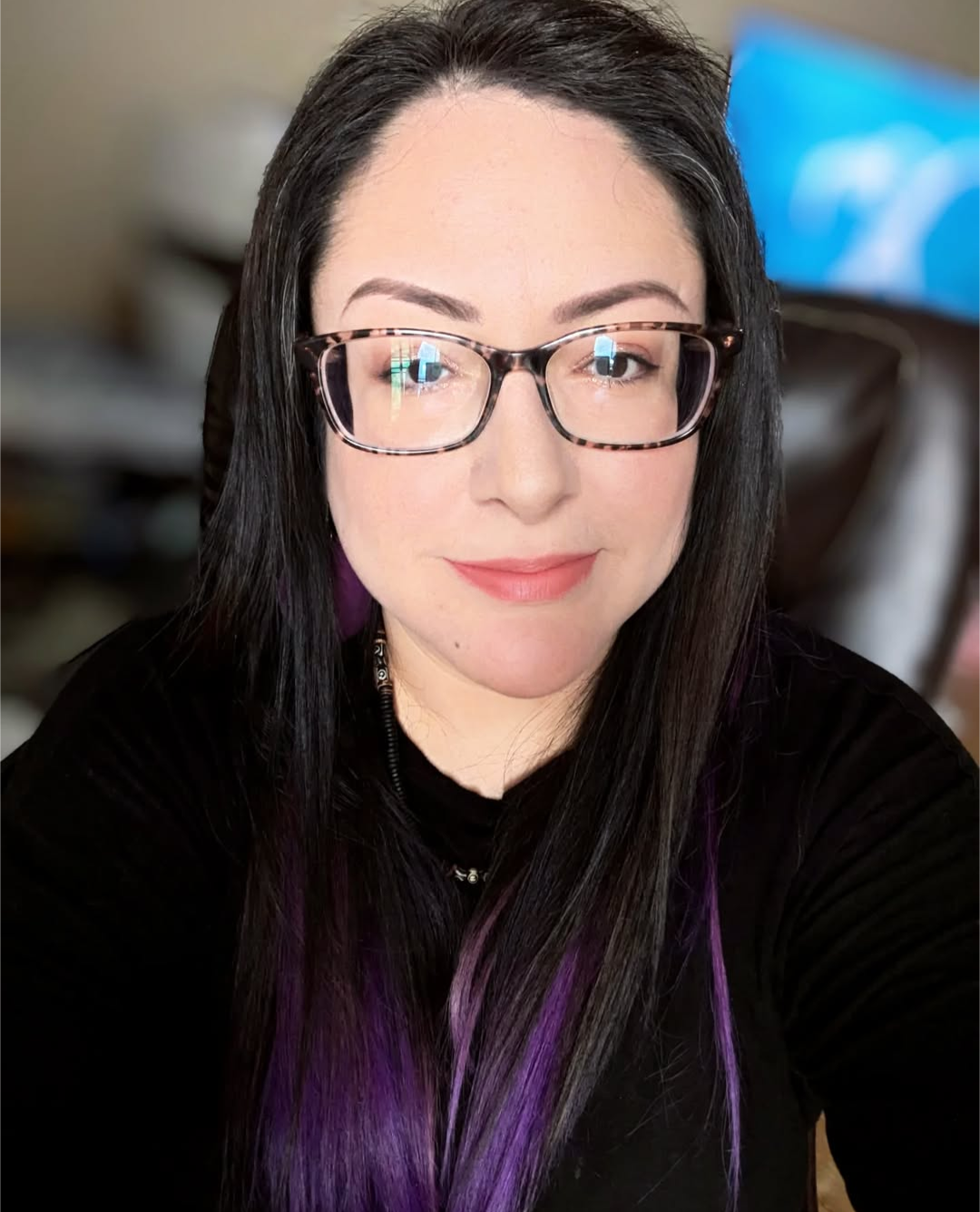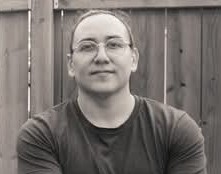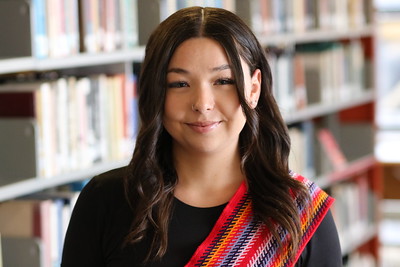2025 Indigenous Summer Scholars
The 2025 Indigenous Summer Scholars are a diverse group of students, with majors from Biochemistry to Psychology to Women's and Gender Studies. They are contributing to a set of equally diverse summer research projects, with topics ranging from the carceral system to the neuroimaging of humor perception.
Over the course of twelve weeks these students will be immersed in their assigned research project and mentored directly by their ISSP supervisor.
In addition to gaining hands-on research experience, the summer scholars will participate in a series of workshops to build their academic and research skills. They will also experience social and cultural activities such as a welcoming feast, sharing circles, and beading workshops.
Meet the 2025 Scholars
Degree Program: Psychology
ISSP Supervisor: Dr. Laura Forsythe
ISSP Project: BIPOC Inclusion in Education
 My father is Ukranian from Thunder Bay, Ontario. My mother is an Ojibwe Indigenous woman originally from Seine River First Nations, Ontario but had to give up her status when she married young. Myself, as well as my sibling are all registered members of Rainy River First Nations, Ontario. Though, we are all born in Winnipeg, Manitoba. I have recently been accepted into graduate school, and I have been an ISSP alumni for 2 years and each year it has inspired me and helped me to flourish and encourage me to be inspired by research and having the opportunity to work with Indigenous peers. My graduate program has an Indigenous Knowledges focus, and had it not been for the encouragement from ISSP, I do not know if I would have come this far. It has made me want to reach back into my community and help people who have felt hopeless with no direction, and I thought a career in social work would help me to do that.
My father is Ukranian from Thunder Bay, Ontario. My mother is an Ojibwe Indigenous woman originally from Seine River First Nations, Ontario but had to give up her status when she married young. Myself, as well as my sibling are all registered members of Rainy River First Nations, Ontario. Though, we are all born in Winnipeg, Manitoba. I have recently been accepted into graduate school, and I have been an ISSP alumni for 2 years and each year it has inspired me and helped me to flourish and encourage me to be inspired by research and having the opportunity to work with Indigenous peers. My graduate program has an Indigenous Knowledges focus, and had it not been for the encouragement from ISSP, I do not know if I would have come this far. It has made me want to reach back into my community and help people who have felt hopeless with no direction, and I thought a career in social work would help me to do that.
Degree Program: Indigenous Studies/Urban and Inner-City Studies
ISSP Supervisor: Drs. Mavis Reimer and Melanie Braith
ISSP Project: The Six Seasons of the Asiniskaw Īthiniwak
 Taanshi! Brooke Buchan d-ishinihkaashon. En Michif niya. Ma paraañtii kayaash oschi la vaalii rivyeer roozh pi St. Laurent pi Lake Manitoba kii-oschiiwak. Lagimodiere pi Chartrand pi Sanderson mii nooñ di famii. My name is Brooke Buchan. I am Red River Michif and a member of the Manitoba Metis Federation. My family comes from the Red River Valley, St. Laurent and Lake Manitoba. My family names are Lagimodiere, Chartrand, and Sanderson. I am currently completing my Bachelor of Arts in Indigenous Studies at the University of Winnipeg. I am a beadwork artist specializing in traditional Metis beadwork. I am also a Michif language learner.
Taanshi! Brooke Buchan d-ishinihkaashon. En Michif niya. Ma paraañtii kayaash oschi la vaalii rivyeer roozh pi St. Laurent pi Lake Manitoba kii-oschiiwak. Lagimodiere pi Chartrand pi Sanderson mii nooñ di famii. My name is Brooke Buchan. I am Red River Michif and a member of the Manitoba Metis Federation. My family comes from the Red River Valley, St. Laurent and Lake Manitoba. My family names are Lagimodiere, Chartrand, and Sanderson. I am currently completing my Bachelor of Arts in Indigenous Studies at the University of Winnipeg. I am a beadwork artist specializing in traditional Metis beadwork. I am also a Michif language learner.
Degree Program: Political Science/Philosophy/Indigenous Studies
ISSP Supervisor: Drs. Bronwyn Dobchuk-Land and Alex Tepperman
ISSP Project: Community archiving of stories of police violence
 My name is Cody Duff, I was born and raised in Pine Falls Manitoba, however my band is Sagkeeng First Nation. My career goal is work in law, as such my ISSP project aims to provide nuance to the indirect ways in which police violence affects us and thus allow me to better serve not just my Indigenous communities but as well as others who are affected by the existence of the carceral system.
My name is Cody Duff, I was born and raised in Pine Falls Manitoba, however my band is Sagkeeng First Nation. My career goal is work in law, as such my ISSP project aims to provide nuance to the indirect ways in which police violence affects us and thus allow me to better serve not just my Indigenous communities but as well as others who are affected by the existence of the carceral system.
Degree Program: English (Honours)
ISSP Supervisor: Dr. Janis Thiessen
ISSP Project: Manitoba Food History Project
 Hello! My name is Jo-Lyn Gregoire. I am a Red River Métis student graduating with my BA (Hons) in English this year. My family is from Emerson, Manitoba and I moved to Winnipeg to pursue my post-secondary education.
Hello! My name is Jo-Lyn Gregoire. I am a Red River Métis student graduating with my BA (Hons) in English this year. My family is from Emerson, Manitoba and I moved to Winnipeg to pursue my post-secondary education.
This summer I will be conducting oral history research as part of Dr. Janis Thiessen’s Manitoba Food History Project. We have begun with an in-depth introduction to oral history and field recording, and I will be creating my research questions and practicing the interview process in the coming weeks. I am then travelling to The Pas to conduct an interview in June, including separate material to allow for the creation of a podcast episode. Our goal is to end the summer with both a newly conducted and archived interview and a planned episode for Preserves: The Manitoba Food History Podcast.
I applied to the ISSP to learn more about my Métis culture. It provides a community of fellow scholars, cultural and research focused workshops, and invaluable opportunities for connections. I plan to apply to the Joint Master of Arts in History archival studies stream after completing my research.
Degree Program: Biology
ISSP Supervisor: Dr. Yannick Molgat-Seon
ISSP Project: Assessing the Influence of the Work of Breathing on Sex-differences in Inspiratory Muscle Activation during Exercise
 My name is Gracie Grift (Brown Horse Woman) and I am a proud member of the Red River Métis Nation and a descendent of the Makwa Dodem (Bear Clan). I have completed three NSERC USRAs and the Pathway to Graduate Studies Program under the guidance of Dr. Yannick Molgat-Seon, looking at sex-differences in respiratory system physiology. Participating in the Indigenous Summer Scholars Program will allow me to complete my final project, further advance my research skills, and connect with my Indigenous community on campus. Learning the technical skills of research will allow me to one day achieve my dream of conducting research with and for my Indigenous nation. I hope that through research I can advance reconciliation in health across Turtle Island.
My name is Gracie Grift (Brown Horse Woman) and I am a proud member of the Red River Métis Nation and a descendent of the Makwa Dodem (Bear Clan). I have completed three NSERC USRAs and the Pathway to Graduate Studies Program under the guidance of Dr. Yannick Molgat-Seon, looking at sex-differences in respiratory system physiology. Participating in the Indigenous Summer Scholars Program will allow me to complete my final project, further advance my research skills, and connect with my Indigenous community on campus. Learning the technical skills of research will allow me to one day achieve my dream of conducting research with and for my Indigenous nation. I hope that through research I can advance reconciliation in health across Turtle Island.
Degree Program: Biology
ISSP Supervisor: Dr. Alberto Civetta
ISSP Project: Functional characterization of a Drosophila melanogaster orphan seminal fluid protein
 My name is Hope Human and I am a Red River Métis student entering my final year of my undergraduate biology degree. My ancestors held Scrip in the St. James area, while my immediate family and I have moved all around Manitoba - from Thompson to Selkirk. As I pursue a career as a Physician Assistant following my graduation, the integration of theoretical knowledge and practical skill through hands-on laboratory work will serve as an asset in my future as a PA. As well, the many cultural experiences provided by the ISSP and the networks formed with other Indigenous scholars and mentors will allow me to deepen my own connection to my Indigenous ancestry, and also learn from the perspectives of other Indigenous students. As a PA, I hope to provide valuable healthcare to underserved communities within our province and throughout Canada, many of which include our Indigenous communities. Through the cultural and technical knowledge gained in the ISSP program, I hope to someday serve as an informed healthcare provider for all patients, but with an understanding of the importance of Indigenous values and traditions within our healthcare system.
My name is Hope Human and I am a Red River Métis student entering my final year of my undergraduate biology degree. My ancestors held Scrip in the St. James area, while my immediate family and I have moved all around Manitoba - from Thompson to Selkirk. As I pursue a career as a Physician Assistant following my graduation, the integration of theoretical knowledge and practical skill through hands-on laboratory work will serve as an asset in my future as a PA. As well, the many cultural experiences provided by the ISSP and the networks formed with other Indigenous scholars and mentors will allow me to deepen my own connection to my Indigenous ancestry, and also learn from the perspectives of other Indigenous students. As a PA, I hope to provide valuable healthcare to underserved communities within our province and throughout Canada, many of which include our Indigenous communities. Through the cultural and technical knowledge gained in the ISSP program, I hope to someday serve as an informed healthcare provider for all patients, but with an understanding of the importance of Indigenous values and traditions within our healthcare system.
Degree Program: Criminal Justice
ISSP Supervisor: Drs. Bronwyn Dobchuk-Land and Alex Tepperman
ISSP Project: The Prison Speaks: Analyzing the presentation of carceral institutions in Manitoba
 My family comes from St.Theresa Point, MB located within Treaty 5 territory. I have resided in Winnipeg, MB for the majority of my life, where my partner and I raise our 3 children.
My family comes from St.Theresa Point, MB located within Treaty 5 territory. I have resided in Winnipeg, MB for the majority of my life, where my partner and I raise our 3 children.
I have completed a 4 year Bachelor of Honours degree in Criminal Justice. The focus of my work has been centered on Indigenous injustice. The ISSP supports my academic aspirations as the purpose for my work has been to respresent the Indigenous voices that have been silenced, unheard or ignored. I have also had the privilege and the honour in bringing attention to these issues in an academic setting. The aim for my work is to contribute to justice for Indigenous peoples.
Degree Program: Neuroscience
ISSP Supervisor: Dr. Stephen Smith
ISSP Project: Using event-related potentials to investigate neural mechanisms associated with humor
 Hello, My name is Cassidy Lamirande and I'm a Metis and Ojibwe woman with family ties to Duck Bay. I recently graduated with my bachelor of sciences honors degree majoring in Neuroscience. The ISSP program has been a huge factor in my future educational goals as it's helping me complete my thesis research to collect more data with the goals of a publication. This program is also helping me by providing professional development workshops that will enhance my knowledge of research and better prepare me for medical school applications.
Hello, My name is Cassidy Lamirande and I'm a Metis and Ojibwe woman with family ties to Duck Bay. I recently graduated with my bachelor of sciences honors degree majoring in Neuroscience. The ISSP program has been a huge factor in my future educational goals as it's helping me complete my thesis research to collect more data with the goals of a publication. This program is also helping me by providing professional development workshops that will enhance my knowledge of research and better prepare me for medical school applications.
Degree Program: Women's and Gender Studies
ISSP Supervisor: Drs. Angela Failer and Heather Milne
ISSP Project: Museum Queeries
 My Cree and Anishinaabe ancestry come from my maternal family who is from Peguis First Nation. My great-great grandparents and their children were of the many families forcibly removed from their original location in St Peter’s reserve (now Selkirk) in 1907.
My Cree and Anishinaabe ancestry come from my maternal family who is from Peguis First Nation. My great-great grandparents and their children were of the many families forcibly removed from their original location in St Peter’s reserve (now Selkirk) in 1907.
The ISSP will support my future educational and career goals by giving me the tools, resources, and connections I need to conduct research as an Indigenous queer person. I plan to pursue graduate studies to continue decolonising Indigenous queer representations and understandings.
By centring Indigenous queer folks in my research, I hope to contribute to Indigenous-led queer representation in curatorial institutions. The rich diversity of Indigenous queer understandings and experiences deserve to be centred, and they are necessary for decolonising and Indigiqueering curatorial spaces. I hope my research will promote the restoration of Two-Spirit, trans, gender diverse, and queer folks in our communities and decolonise their institutional representations.
Degree Program: Biochemistry
ISSP Supervisor: Drs. Caleb Hasler (UWinnipeg) and Jillian Detwiler (UManitoba)
ISSP Project: Parasite Ecology in Manitoba
 Taanishi, Leena Tetrault dishinikaashoon. I am a Red River Métis student at the University of Winnipeg. My family has deep roots across Manitoba, and I aim to continue our Métis traditions of ingenuity, curiosity, and connection to the land. I work as a research assistant at the University of Manitoba, focusing on parasite ecology, an area with several implications for environmental health and Indigenous food systems. After graduating, I intend to pursue a career in medicine as a family doctor in Northern Manitoba. The ISSP will help make this possible by allowing me to focus on building a strong academic foundation and staying engaged with mentors, peers, and community networks. Through my work, I hope to give back by sharing research outcomes that support traditional knowledge and sustainable land practices, and by encouraging more Indigenous youth to pursue science grounded in our communities’ values.
Taanishi, Leena Tetrault dishinikaashoon. I am a Red River Métis student at the University of Winnipeg. My family has deep roots across Manitoba, and I aim to continue our Métis traditions of ingenuity, curiosity, and connection to the land. I work as a research assistant at the University of Manitoba, focusing on parasite ecology, an area with several implications for environmental health and Indigenous food systems. After graduating, I intend to pursue a career in medicine as a family doctor in Northern Manitoba. The ISSP will help make this possible by allowing me to focus on building a strong academic foundation and staying engaged with mentors, peers, and community networks. Through my work, I hope to give back by sharing research outcomes that support traditional knowledge and sustainable land practices, and by encouraging more Indigenous youth to pursue science grounded in our communities’ values.
Degree Program: Biochemistry
ISSP Supervisor: Dr. Sanoji Wijenayake
ISSP Project: Nanovesicles in human milk may decrease the risk of obesity in children
 My name is Maya Tighe and I am a member of the Red River Métis Nation. This fall I will begin my graduate studies in the Wijenayake lab, where we are investigating some of the neurodevelopmental and neuroinflammatory effects of early life exposure to maternal obesity and the unique characteristics of Milk-derived exosomes. The ISSP program has given me the opportunity to get a head start on my research and has provided me with a community within the University. I am still unsure of the exact job tittle I would like to have in the future at this point, and lean towards the healthcare system. I do for sure however plan on growing my understanding of Indigenous based medicine and healing practices. Learning where, and how I can integrate these ideologies into my research is where my goals remain at this point.
My name is Maya Tighe and I am a member of the Red River Métis Nation. This fall I will begin my graduate studies in the Wijenayake lab, where we are investigating some of the neurodevelopmental and neuroinflammatory effects of early life exposure to maternal obesity and the unique characteristics of Milk-derived exosomes. The ISSP program has given me the opportunity to get a head start on my research and has provided me with a community within the University. I am still unsure of the exact job tittle I would like to have in the future at this point, and lean towards the healthcare system. I do for sure however plan on growing my understanding of Indigenous based medicine and healing practices. Learning where, and how I can integrate these ideologies into my research is where my goals remain at this point.
